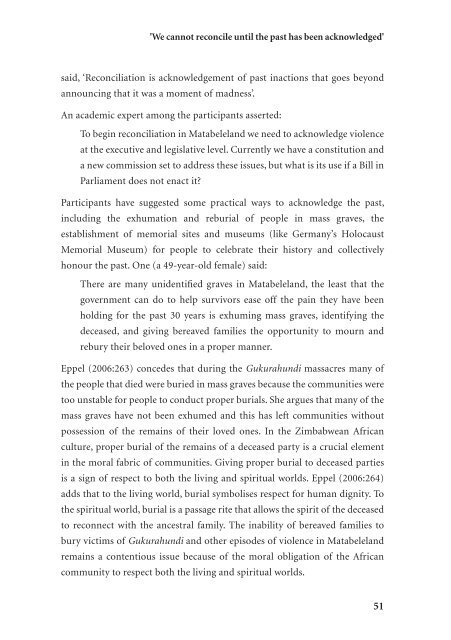ACCORD-ajcr-2015-1
ACCORD-ajcr-2015-1
ACCORD-ajcr-2015-1
- No tags were found...
Create successful ePaper yourself
Turn your PDF publications into a flip-book with our unique Google optimized e-Paper software.
'We cannot reconcile until the past has been acknowledged'<br />
said, ‘Reconciliation is acknowledgement of past inactions that goes beyond<br />
announcing that it was a moment of madness’.<br />
An academic expert among the participants asserted:<br />
To begin reconciliation in Matabeleland we need to acknowledge violence<br />
at the executive and legislative level. Currently we have a constitution and<br />
a new commission set to address these issues, but what is its use if a Bill in<br />
Parliament does not enact it?<br />
Participants have suggested some practical ways to acknowledge the past,<br />
including the exhumation and reburial of people in mass graves, the<br />
establishment of memorial sites and museums (like Germany’s Holocaust<br />
Memorial Museum) for people to celebrate their history and collectively<br />
honour the past. One (a 49-year-old female) said:<br />
There are many unidentified graves in Matabeleland, the least that the<br />
government can do to help survivors ease off the pain they have been<br />
holding for the past 30 years is exhuming mass graves, identifying the<br />
deceased, and giving bereaved families the opportunity to mourn and<br />
rebury their beloved ones in a proper manner.<br />
Eppel (2006:263) concedes that during the Gukurahundi massacres many of<br />
the people that died were buried in mass graves because the communities were<br />
too unstable for people to conduct proper burials. She argues that many of the<br />
mass graves have not been exhumed and this has left communities without<br />
possession of the remains of their loved ones. In the Zimbabwean African<br />
culture, proper burial of the remains of a deceased party is a crucial element<br />
in the moral fabric of communities. Giving proper burial to deceased parties<br />
is a sign of respect to both the living and spiritual worlds. Eppel (2006:264)<br />
adds that to the living world, burial symbolises respect for human dignity. To<br />
the spiritual world, burial is a passage rite that allows the spirit of the deceased<br />
to reconnect with the ancestral family. The inability of bereaved families to<br />
bury victims of Gukurahundi and other episodes of violence in Matabeleland<br />
remains a contentious issue because of the moral obligation of the African<br />
community to respect both the living and spiritual worlds.<br />
51


